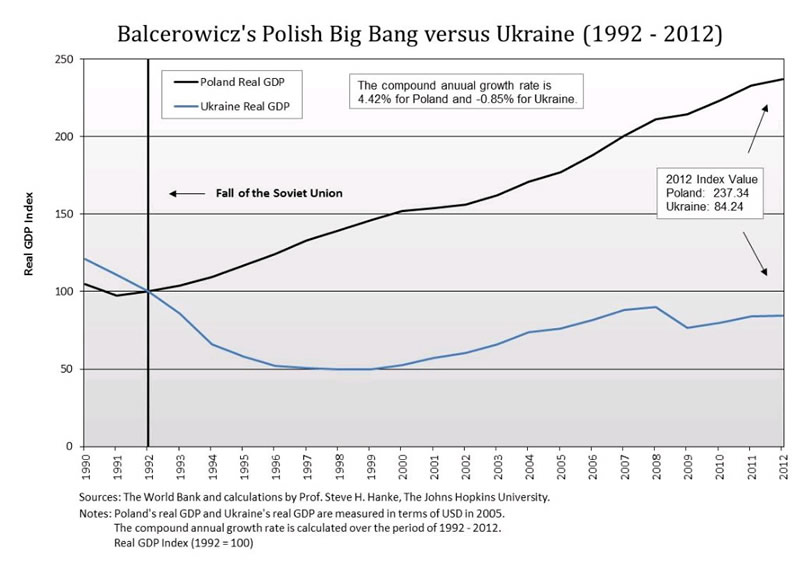Balcerowicz’s Polish Big Bang versus Ukraine
Politics / Economic Theory May 20, 2014 - 05:30 PM GMTBy: Steve_H_Hanke
 On May 21, 2014, Leszek Balcerowicz will receive the 2014 Milton Friedman Prize for Advancing Liberty during a dinner at the Waldorf-Astoria Hotel in New York. The prestigious annual award by the Cato Institute carries with it a well-deserved check for $250,000.
On May 21, 2014, Leszek Balcerowicz will receive the 2014 Milton Friedman Prize for Advancing Liberty during a dinner at the Waldorf-Astoria Hotel in New York. The prestigious annual award by the Cato Institute carries with it a well-deserved check for $250,000.
For those who might have forgotten the accomplishments of my long-time friend, allow me to suggest that, in Balcerowicz’s case, a picture is literally worth a thousand words.
But, before the picture, a little background.
In 1989, Balcerowicz became Poland’s Deputy Prime Minister and Finance Minister in Eastern Europe’s first non-communist government since World War II. Balcerowicz held these positions from 1989 through 1991, and again from 1997 through 2000. Subsequently, in 2001, he became the Chairman of the National Bank of Poland, a post he held until January 2007.
A student of the “Five P’s”: prior preparation prevents poor performance; Balcerowicz was ready when he first took office in 1989. Indeed, he pulled his comprehensive economic game plan to liberalize and transform the Polish economy out of his desk drawer and proceeded to implement what became known as the “Big Bang”. As they say, the rest is history.
The results of the “Big Bang” speak for themselves in the accompanying chart. Poland’s economy has more than doubled since the fall of the Soviet Union in 1992, growing at an average annual rate of 4.42%.

What about neighboring Ukraine? The contrast with Balcerowicz’s Poland couldn’t be starker. As Oleh Havrylyshyn, the former deputy finance minister of Ukraine, spells out in his classic book – Divergent Paths in Post-Communist Transformation: Capitalism for All or Capitalism for the Few – Ukraine rejected the Big Bang, free-market approach to reform. In consequence, it has taken a road to nowhere, remaining in the shadow of a corrupt communist system.
Unlike Poland’s prosperity, Ukraine has witnessed a post-Soviet contraction in its economy. Yes, the Ukrainian economy has been contracting at a real annual rate of almost 1% since the fall of the Soviet Union. Accordingly, it is smaller today in real terms than it was in 1992.
Many think the International Monetary Fund, which just ponied up $17 billion for Ukraine, will turn things around. Don’t hold your breath. Over the years, the IMF has dispensed its medicine and money in Ukraine with negative results.
When it comes to much-needed liberal economic reforms, one has to do something big; something that captures the public’s imagination and garners wide support. Unfortunately, Ukraine lacks a clear economic game plan – one with wide popular support.
By Steve H. Hanke
www.cato.org/people/hanke.html
Twitter: @Steve_Hanke
Steve H. Hanke is a Professor of Applied Economics and Co-Director of the Institute for Applied Economics, Global Health, and the Study of Business Enterprise at The Johns Hopkins University in Baltimore. Prof. Hanke is also a Senior Fellow at the Cato Institute in Washington, D.C.; a Distinguished Professor at the Universitas Pelita Harapan in Jakarta, Indonesia; a Senior Advisor at the Renmin University of China’s International Monetary Research Institute in Beijing; a Special Counselor to the Center for Financial Stability in New York; a member of the National Bank of Kuwait’s International Advisory Board (chaired by Sir John Major); a member of the Financial Advisory Council of the United Arab Emirates; and a contributing editor at Globe Asia Magazine.
Copyright © 2014 Steve H. Hanke - All Rights Reserved
Disclaimer: The above is a matter of opinion provided for general information purposes only and is not intended as investment advice. Information and analysis above are derived from sources and utilising methods believed to be reliable, but we cannot accept responsibility for any losses you may incur as a result of this analysis. Individuals should consult with their personal financial advisors.
Steve H. Hanke Archive |
© 2005-2022 http://www.MarketOracle.co.uk - The Market Oracle is a FREE Daily Financial Markets Analysis & Forecasting online publication.



